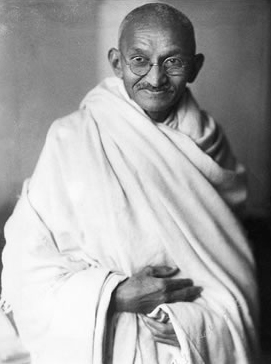Difference between revisions of "Mohandas K. Gandhi"
(→Motion picture: Kingsley if of Indian descent) |
(my speculation was brilliantly UNfounded, because Kingsley ain't no whitebread: he be wholewheat!) |
||
| Line 28: | Line 28: | ||
==Motion picture== | ==Motion picture== | ||
| − | Richard Attenborough's 1982 film, entitled simply ''Gandhi,'' won eight Academy Awards, including "best picture," as well as BAFTA and Golden Globe awards. It is a biographical film that stays close to the historical facts of Gandhi's life. Film critic Roger Ebert said that actor [[Ben Kingsley]] "makes the role so completely his own that there is a genuine feeling that the spirit of Gandhi is on the screen." | + | Richard Attenborough's 1982 film, entitled simply ''Gandhi,'' won eight Academy Awards, including "best picture," as well as BAFTA and Golden Globe awards. It is a biographical film that stays close to the historical facts of Gandhi's life. Film critic Roger Ebert said that actor [[Ben Kingsley]] (half Indian and half English) "makes the role so completely his own that there is a genuine feeling that the spirit of Gandhi is on the screen." |
==Spelling== | ==Spelling== | ||
Revision as of 00:03, November 12, 2008
Mohandas Karamchand Gandhi (1869-1948) also known by the honorific title Mahatma Gandhi, was a great leader who obtained India's independence from Britain. He urged peaceful civil disobedience to the British,[1] calling on Indians to refuse to pay taxes to Britain and refuse to attend British schools. He also called for a boycott of British manufactures, especially for the cloths that Indian weavers are so famous for. The Indians heeded Gandhi’s leadership and stopped buying British cloth. Gandhi also called for the Indian National Congress to change from an elite or wealthy group into more of a people’s voice that could advocate independence. Gandhi drew upon Christian concepts as well as his native Hinduism. His education included studying law at the University College London, though Gandhi makes little mention of that in his autobiography and details are unclear.
One of Gandhi’s acts of protest was to lead the Salt March in 1930 for 240 miles to the sea, so that Indians could obtain salt from evaporated salt water rather than buy it from (and pay taxes to) Britain. A law required Indians to buy salt from the British government, but Gandhi’s march peacefully disobeyed that law and created much publicity. Gandhi and many of his supporters were eventually arrested for some of their protests.
At one point a British leader agreed to meet with Gandhi, who then attended with the simple Hindu clothing of a single cloth gown. Offended by this, some British demanded an explanation. Gandhi responded that the British official, who was dressed in the customary suit and tie, was wearing enough clothes for both of them!
Eventually Gandhi’s protest efforts paid off, as the British Parliament enacted the Government of India Act in 1935. This established self-rule at a local level and allowed some democratic elections. Muslims, however, feared majority Hindu rule and requested a separate state for Muslims. The Muslim League endorsed the creation of a new country called “Pakistan” for the predominantly Muslim population of that region. India and Pakistan are fully independent today.
Gandhi was a vegetarian and would go on fasts for causes of peace. He was assassinated by Hindu ultra-nationalists on 20 January 1948, shortly after Indian independence.
Famous quotes
- First they ignore you. Then they ridicule you. Then they fight you. Then you win.
- “There is nothing that wastes the body like worry, and one who has any faith in God should be ashamed to worry about anything whatsoever” [2]
- "What difference does it make to the dead, the orphans and the homeless, whether the mad destruction is wrought under the name of totalitarianism or the holy name of liberty or democracy?" [3]
- "Non-violence is the first article of my faith. It is also the last article of my creed." [4]
- (When asked what he thought of Western civilization):"I think it would be a very good idea."
- (Later in his life when he was asked whether he was a Hindu, he replied:) :"Yes I am. I am also a Christian, a Muslim, a Buddhist and a Jew."
- "I like your Christ, I do not like your Christians. Your Christians are so unlike your Christ."
Motion picture
Richard Attenborough's 1982 film, entitled simply Gandhi, won eight Academy Awards, including "best picture," as well as BAFTA and Golden Globe awards. It is a biographical film that stays close to the historical facts of Gandhi's life. Film critic Roger Ebert said that actor Ben Kingsley (half Indian and half English) "makes the role so completely his own that there is a genuine feeling that the spirit of Gandhi is on the screen."
Spelling
Gandhi's last name is very frequently spelled incorrectly as "Ghandi," perhaps because "g-h" is a common digraph in English while "d-h" is not.
He was called the Mahatma, or the Great Soul
See also
External links
References
- ↑ Gandhi's ethic of nonviolence ... calls on each of us to break the self-perpetuating cycle of violence and revenge -- of action and reaction -- by recognizing the common humanity we share with those we consider our enemies. Gandhi put this philosophy into practice by developing a technique of militant nonviolence that was intended to force the British to see the humanity of those they oppressed, and the inhumanity of their own actions[1]
- ↑ http://thinkexist.com/quotes/mahatma_gandhi/
- ↑ Non-violence in Peace and War (1942) Vol I, ch. 142
- ↑ Speech at Shahi Bag, 18th March 1922, on a charge of sedition

